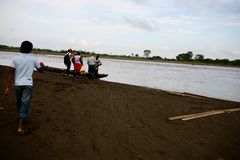In 2003, the Inter-American Court of Human Rights granted provisional measures to these communities, ordering the Colombian State to "adopt such measures as may be necessary to protect the life and the right to humane treatment of all the members of the Communities of Jiguamiandó and Curbaradó and ensure that the beneficiaries of these measures can continue to live in their usual residence, without fear of coercion or threat, and that displaced persons may return to their homes or to the ‘humanitarian areas' established by these Communities".1 The Court ratified these measures several times, most recently in 2010
The Constitutional Court issues rulings in favour of the inhabitants of the Humanitarian Zones
The Constitutional Court has also followed up on the issues faced by these communities. Order 005 of 2009, the goal of which the protection of the fundamental rights of the Afro-descendent population subjected to forced displacement, highlights the gravity of the lack of protection and the vulnerability faced by the communities of Curbaradó and Jiguamiandó. With respect to the reports of the threats, persecution, surveillance, attempted murders, and disrespect for the cultural symbols and expressions of these communities, the Constitutional Court ordered the Colombian government to "adopt without delay the measures issued by the Inter-American Court of Human Rights."3
Later, in Order 448, the Constitutional Court expressed "uncertainty with respect to the representation of the Curbaradó community, since (...) it is not clear who legitimately represents the Curbaradó Community Council."4 Given this situation, the Court decided to suspend the administrative restitution and physical handing over of the collective territories until the process to carry out a census and description of the population has been completed -in order to identify the traditional inhabitants of the area- and the legitimate authorities of the collective territories has been clarified.5

